Didik's Journey To Orangutan Baby School
Shot and stolen from the wild, one orphaned orangutan, an emblem of conservation efforts, gets a second chance.
By Vicki Croke
He's proved to be a fighter, more resilient than anyone could have imagined when he was rescued from a shop in West Borneo on June 14.
On that very first day, what the experienced team from International Animal Rescue (IAR) saw was a baby orangutan near death. Most likely he had been stolen from the wild, and kept as someone's pet before being abandoned among shelves of groceries and hardware items. He was in pain, malnourished, and suffering from skin and eye infections.
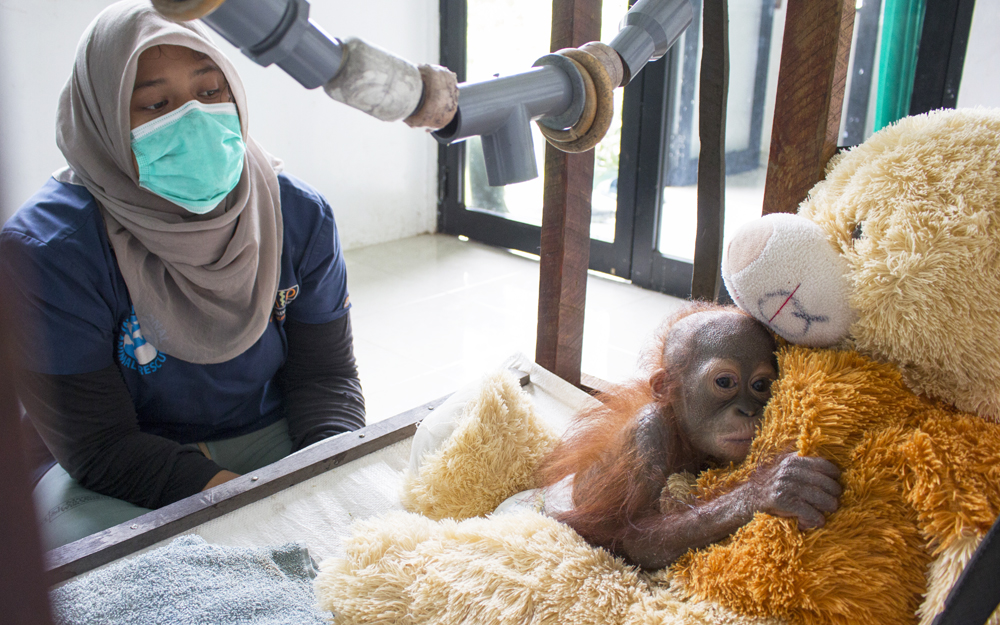
When he arrived, little Didik was depressed, in pain, and unable to eat. (Caretakers at the IAR facility wear face masks because all the orangutans are vulnerable to human disease.) Photo: IAR.
Back at the IAR facility on Borneo, which cares for 109 other rescued orangutans-- mostly adolescents and babies-- caretakers named their latest arrival Didik. A thorough exam revealed how dire the orangutan's situation was: X-rays showed a bullet was lodged in his right shoulder. And he weighed in at only six pounds. That's closer to the size of an infant than the 18-month-old that the development of his teeth revealed he was.
Didik's story is emblematic of the plight of many orangutans. Both Bornean and Sumatran orangutans are critically endangered, losing their forest homes to fire, logging, and oil palm plantations.
“The situation for orangutan populations has reached a critical point. The Bornean orangutan population has declined by 50 percent in the past 60 years and that rapid decline is showing no sign of slowing down. The main threats to the species are habitat loss and illegal hunting. Deforestation to convert land to palm oil plantations and other agro-industries is rapidly destroying the orangutans' forest home." -- Lis Key, International Animal Rescue
Last year, fires started by land clearance efforts and fanned by El nino weather conditions "turned a really desperate situation for the orangutans into a crisis of massive proportions," Key says in an email. IAR reports that five million acres of forest were likely lost.
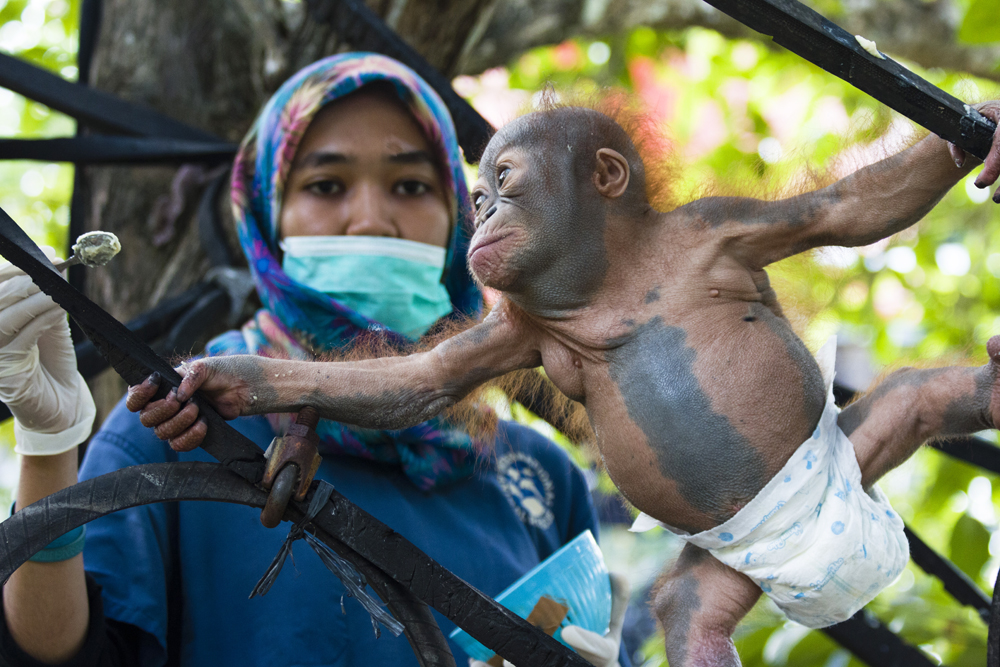
As Didik began to feel better, his babysitters could use food rewards to encourage him to climb. Didik’s hair was sparse from malnutrition, but the patchy pigmentation of his skin is normal. Photo: IAR.
All of that makes it easier for hunters to find orangutans. Apes searching for food on farms come into conflict with people. "The adults are in danger of being killed and even eaten," Key says, "while the babies are captured and kept or sold as pets."
It's a terrible, and often short, life for baby orangutans grabbed for the pet trade. They are intelligent and sensitive apes, bonded to mothers who are often killed right in front of them.
The stolen babies who land in someone's home are vulnerable to disease, and even when fed, may end up starving because they are given all the wrong foods. As Key explains of Didik's situation, "This is not the first time the team have taken in young orangutans that are sick because they have been fed an inappropriate diet and kept in unsuitable conditions. People often feed them a human diet – rice in particular and food with lots of additives. A number of babies had been fed on nothing but condensed milk for months on end, which made them very ill indeed."
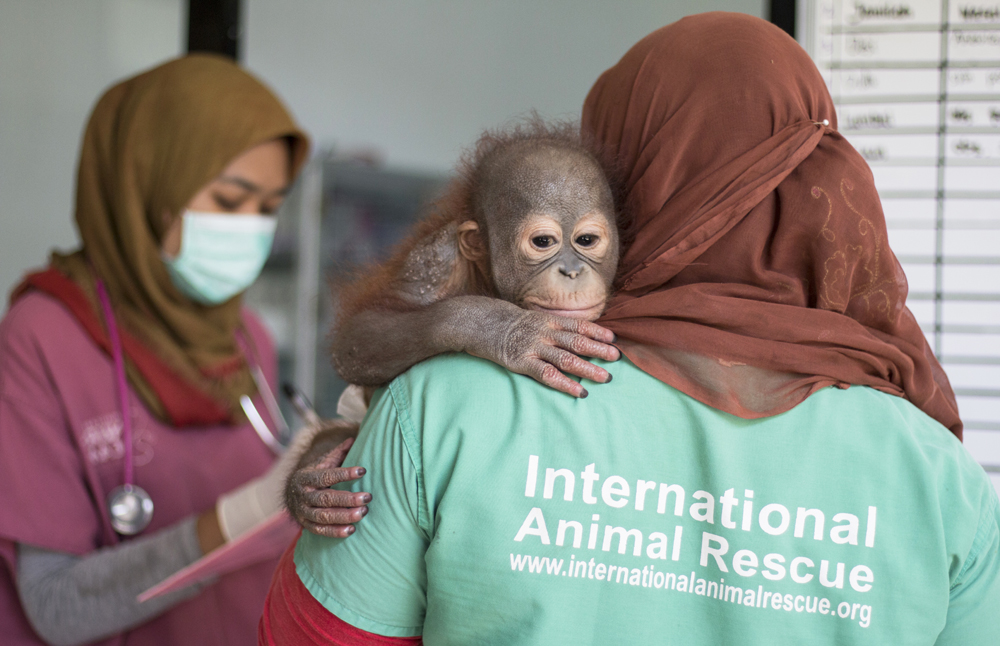
An important part of Didik’s care is making sure he doesn’t become attached to just one babysitter. International Animal Rescue works on the rescue, rehabilitation, and reintroduction to the wild of orangutans in Borneo and Sumatra, and other kinds of animals around the world. Photo: IAR.
Even if they survive, things get worse. Key explains, "When they grow bigger and stronger they are chained up or caged, often spending years in captivity, unable to express any natural behaviours." In Indonesia, there are laws to prevent the killing or capture of orangutans. And it is also illegal to keep one. "But many people," Key says, "particularly those living in rural areas, don't know that – and some do know it's illegal but do it anyway."
Rehabilitating these orphans, even early on, is a complicated task. Once with the experts at IAR, Didik was offered nutritious food. But he was still so sick that he had trouble eating.
He was also emotionally traumatized. "For an animal like an orangutan, witnessing the death of its mother is a profoundly shocking experience. That is undoubtedly why Didik looks so sad and depressed," IAR veterinarian Karmele Llano Sanchez explained in a statement when Didik was first being treated. "It will take a long time for him to recover from the nightmare he has been through and start to take an interest in his surroundings."
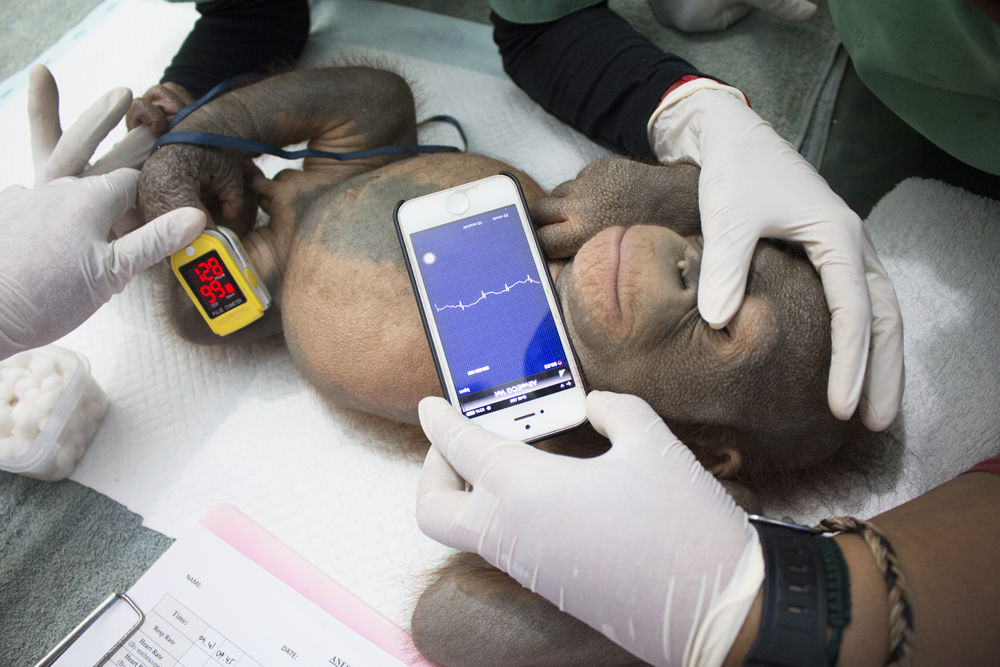
When Didik was strong enough, veterinarians performed surgery to remove a bullet from his shoulder. Photo: IAR.
As for Didik's other treatments, even the sulfur baths to help his fungal skin infection, were a torment. No matter how gentle caretakers were with him, he would cry out in pain and confusion.
But over weeks, in a safe and stable environment with experienced caretakers, Didik began to eat. In fact, by July 15 he had almost doubled his weight.
He had enough energy to climb the rubber-ropes set up as a kind of jungle gym 101. He still looked worried sometimes--afraid of heights, the team said, but he was working on it.
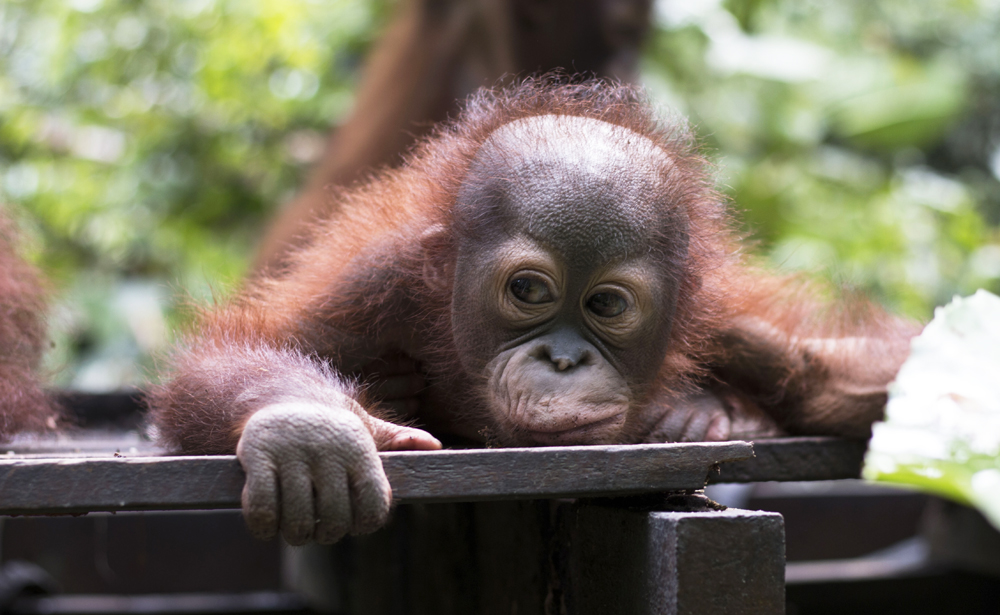
In baby school, Didik is learning the skills necessary to survive in the wild. The process will take years. Photo: IAR.
Soon enough, he was strong enough for surgery. And the bullet was close to the surface and easy to remove. That meant that by September 8, Didik was ready to be enrolled in baby school: out of quarantine and allowed the company of other young orangutans.
His personality really began to emerge. "Didik is proving to be a bold and independent character," Lis Key says. "He isn't clingy around the other orangutans and has shown great aptitude for climbing. Now that he is in baby school he is often seen climbing high up in the trees which bodes really well for his chances of returning to the wild one day (but not for some years yet!)"
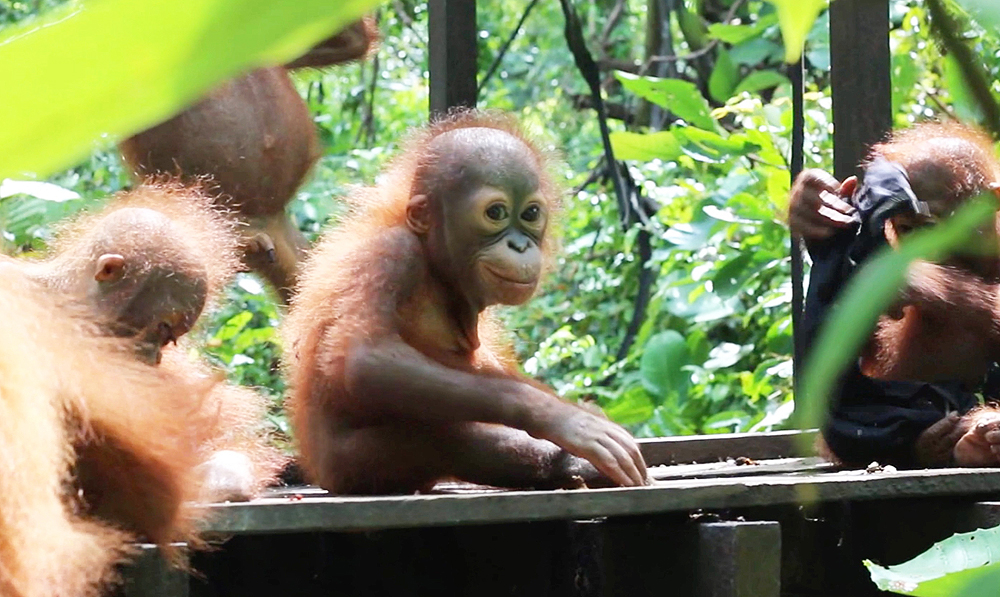
Didik is a model student in baby school: bold, independent, and confident. Photo: IAR.
Beyond the rescue facility, an extremely tough battle to save the forests is playing out. Inside the facility, the work is complex too. It will take a long time to prepare him for release, but Didik is learning to be a wild orangutan again.
